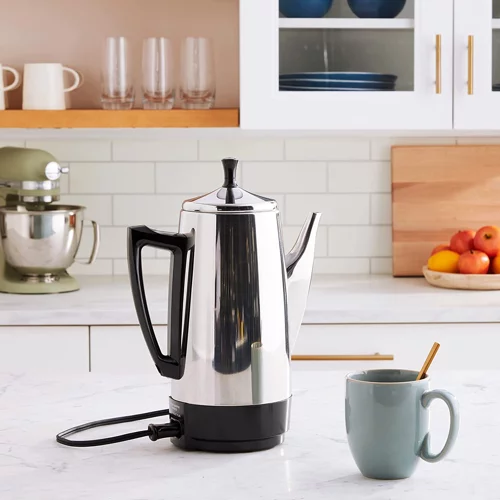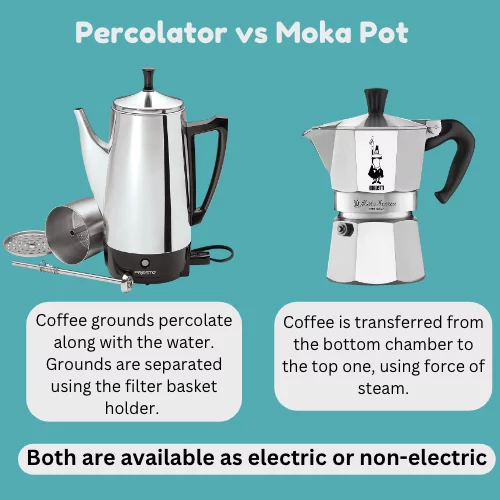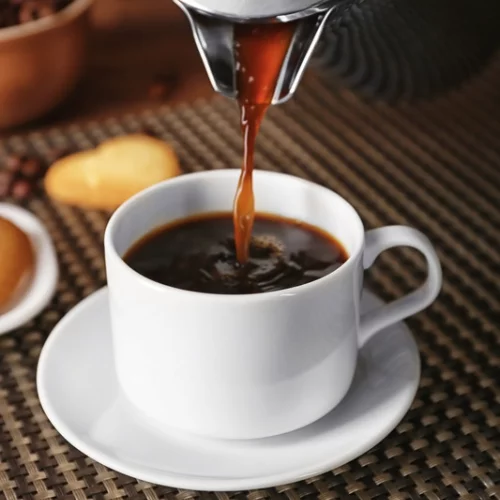Coffee percolators are a great way to make a pot of coffee. They heat water and then force it up through the coffee grounds, which results in a more flavorful cup of coffee.

Percolators are considered to be an old school method of making coffee. It was popular back when drip coffee makers were not a thing. The best part about using a percolator is that you have more control over the strength of your brew. You can add more or less grounds depending on how strong you like your coffee. Leave it to percolate for long, or lessen the time for a lighter brew. It’s easy to use, and many people like the taste of the coffee it produces, which can be stronger than your average drip coffee. The fact that percolators are still around, in a world of so many different coffee brewers, is a testiment to how good they can be.
Percolators vs. Moka Pots – They Are Not the Same

Percolators are often confused with the old school Italian Moka pots, but they are totally different things. The Moka pot uses steam pressure to push the water through the grounds, while a percolator repeats the same process of “churning coffee” over and over until it’s done.
Both are available as a stovetop or electric device.
Moka pots produced coffee that is stronger than a percolator, almost as strong as an espresso shot. Percolator’s coffee is comparable to drip coffee, but is slightly stronger in taste.
Why Choose a Percolator Over Other Brewing Methods

Percolators make a good cup of coffee, and they are easy to use. They can also be used outdoors if you have access to an open flame but no electric outlet. Plus, you don’t need any special filters as you would with other brewing methods.
If you like the taste of strong coffee but don’t want the hassle of using a machine, a non-electric percolator may be the right choice for you.
Overall, percolators are a great choice if you’re looking for an easy way to make a flavorful cup of coffee. So don’t let the old school method fool you – it’s still a great way to get your cup of coffee!
What Coffee and Grind Size to Use for a Percolator?
For coffee type, you don’t need a special type. You can use any kind you prefer. Light, medium or dark roast, whichever you prefer!
For grind size, you’ll want to use coarse or medium coarse coffee.
Can You Use Whole Coffee Beans in a Percolator?
You can’t use whole beans without grinding them first, not in a percolator or any other coffee brewing method. For percolators, the beans have to be coarse grind to produce good coffee.
How Long Does a Percolator Take to Make Coffee?
It depends on how much coffee you’re making. A small amount of coffee will take about 5 minutes and a larger pot of coffee could take up to 15 minutes or more.
Keep in mind that the longer it takes, the stronger the flavor will be because the water has to pass through the grounds multiple times. So if you want a stronger cup of coffee, you may need to wait a bit longer.
You can also adjust the flavor by changing the amount of grounds you add or by leaving it on the heat source for less or more time. Experiment with different brewing times and amounts of grounds until you find what works best for you!
How Do You Know When Percolator Coffee Is Done?
When the coffee starts to sputter, it’s usually done. The sputtering sound is a sign that all of the water has been forced through the grounds and you have a pot of freshly brewed coffee!
In electric percolators, most of them will have a signal or light indicator to let you know the coffee is done.
If it seems too weak for your taste, let it percolate longer until it reaches the desired strength. Or, if you want it stronger, add more coffee grounds when you start the brewing process.
The best way to know when your percolator coffee is done is to pay attention and take note of the time it takes for it to be ready – that way you’ll have an idea of how long to wait next time!
Is Percolator Coffee Bad For You?
No, percolator coffee is not bad for you. But as with all things, it’s best to enjoy in moderation and keep your caffeine intake within recommended limits. Too much caffeine can lead to dehydration, insomnia, headaches and other unpleasant symptoms.
If the concern here is with the percolator itself, then yes, some percolators can be bad for you. Don’t opt for a fully aluminum percolator as those react differently to heat and can produce some metal elements in your coffee that will harm your health overtime.
Always choose your appliance materials carefully. If you’re going to use something that’s coming into direct heat, like a percolator, go for a stainless steel material.
Do You Need a Coffee Filter for a Percolator? Do They Make Filters for Them?
No, you don’t need a coffee filter for a percolator. The brewing process requires no filter as the grounds are kept in a filter basket that separate it from the water. However, if you want to use a paper filter, they do make them specifically for percolators.
Using a paper filter can help reduce the amount of sediment in your coffee, making it easier to drink and less bitter. However, keep in mind that the filter will also reduce some of the flavor from the coffee grounds so adjust your brewing time accordingly if you use one.
Is Percolator Coffee Better than Drip?
That really depends on your personal preference. Both brewing methods make excellent cups of coffee, but the taste and strength may differ slightly depending on how you brew them.
Percolator coffee tends to be stronger because it’s boiled multiple times. Drip coffee is less intense, as the water only passes through the grounds once.
So it really comes down to what you prefer and what kind of flavor you’re looking for in your cup of coffee.
Final Thoughts…
Percolator coffee is a great option for anyone looking for a strong, flavor-packed cup of coffee. To get the best results, use coarse or medium coarse grounds and adjust the brewing time depending on how strong you want your coffee to be. You can also add a paper filter if you want to lessen the sediment in your cup. No matter which way you choose to make it, you’re sure to enjoy a delicious cup of coffee! Happy brewing!
